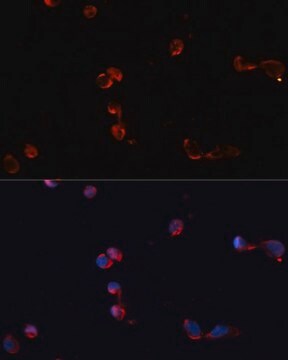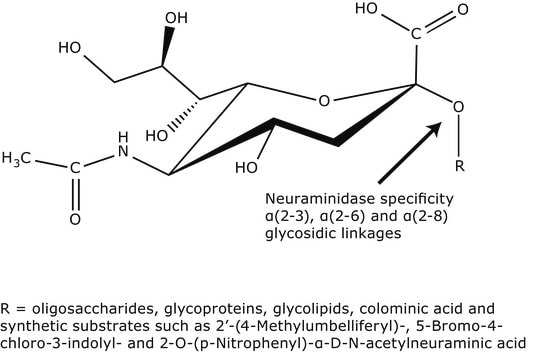おすすめの製品
由来生物
rabbit
結合体
unconjugated
抗体製品の状態
IgG fraction of antiserum
抗体製品タイプ
primary antibodies
クローン
polyclonal
フォーム
buffered aqueous solution
分子量
antigen 26 kDa
強化検証
recombinant expression
Learn more about Antibody Enhanced Validation
テクニック
indirect immunofluorescence: 10 μg/mL using eukaryotic cells transfected with a plasmid bearing the CAT gene
western blot: 10 μg/mL using eukaryotic cells transfected with a plasmid bearing the CAT gene
輸送温度
dry ice
保管温度
−20°C
ターゲットの翻訳後修飾
unmodified
詳細
Chloramphenicol Acetyl Transferases (CATs) shows conservation and differences in their amino acid sequences. CAT is encode by cat gene and exists as monomer and later assemble into a trimer.
特異性
Anti-Chloramphenicol Acetyl Transferase (CAT) antibody is specific for bacterial CAT and recombinant CAT expressed in transfected eukaryotic cells (a predominant band of approx. 26 kD).
免疫原
バクテリアクロラムフェニコ-ルアセチルトランスフェラ-ゼ(CAT)。
アプリケーション
Anti-Chloramphenicol Acetyl Transferase (CAT) has been used in
- immunoblotting
- indirect immunofluorescence
- immunofluorescence microscopy
生物化学的/生理学的作用
Bacterial chloramphenicol acetyl transferase (CAT) is an enzyme that catalyzes the inactivation of the antibiotic, chloramphenicol, by acetylation and subsequently confers bacterial resistance to the antibiotic. CAT, being a stable prokaryotic enzyme, is often used as a reporter gene in transfection assays developed for eukaryotic promoters. Quantification of reporter gene expressions, such as that of CAT, can be correlated to the transcriptional functions of the target sequence. Thus, antibodies directed against CAT can be used for the study of gene sequences that are fused to the CAT reporter gene
Anti-Chloramphenicol Acetyl Transferase (CAT) antibody is specific for bacterial CAT and recombinant CAT expressed in transfected eukaryotic cells (a predominant band of approx. 26 kD). Staining of CAT by the antibody is inhibited by the bacterial CAT antigen in cells transfected with CAT.
Anti-Chloramphenicol Acetyl Transferase (CAT) antibody is specific for bacterial CAT and recombinant CAT expressed in transfected eukaryotic cells (a predominant band of approx. 26 kD). Staining of CAT by the antibody is inhibited by the bacterial CAT antigen in cells transfected with CAT.
物理的形状
0.01M PBS溶液 (pH 7.4, 15mMアジ化ナトリウム含有)。
免責事項
Unless otherwise stated in our catalog or other company documentation accompanying the product(s), our products are intended for research use only and are not to be used for any other purpose, which includes but is not limited to, unauthorized commercial uses, in vitro diagnostic uses, ex vivo or in vivo therapeutic uses or any type of consumption or application to humans or animals.
適切な製品が見つかりませんか。
製品選択ツール.をお試しください
保管分類コード
10 - Combustible liquids
WGK
WGK 3
引火点(°F)
Not applicable
引火点(℃)
Not applicable
適用法令
試験研究用途を考慮した関連法令を主に挙げております。化学物質以外については、一部の情報のみ提供しています。 製品を安全かつ合法的に使用することは、使用者の義務です。最新情報により修正される場合があります。WEBの反映には時間を要することがあるため、適宜SDSをご参照ください。
Jan Code
C9336-.5ML:
C9336-BULK:
C9336-VAR:
Bhaskar Anand Jha et al.
FEBS letters, 589(15), 1966-1974 (2015-06-02)
DRBD13 RNA-binding protein (RBP) regulates the abundance of AU-rich element (ARE)-containing transcripts in trypanosomes. Here we show that DRBD13 regulates RBP6, the developmentally critical protein in trypanosomatids. We also show DRBD13-specific regulation of transcripts encoding cell surface coat proteins including
Chloramphenicol acetyltransferase assay.
Smale, S., T.
Cold Spring Harbor Protocols, doi:10-doi:10 (2010)
Ralph L McWhinnie et al.
Applied and environmental microbiology, 80(1), 226-234 (2013-10-22)
In this work, we describe the identification of synthetic, controllable promoters that function in the bacterial pathogen Francisella novicida, a model facultative intracellular pathogen. Synthetic DNA fragments consisting of the tetracycline operator (tetO) flanked by a random nucleotide sequence were
Yibing Wang et al.
PLoS pathogens, 7(9), e1002258-e1002258 (2011-10-04)
Chlamydia trachomatis remains one of the few major human pathogens for which there is no transformation system. C. trachomatis has a unique obligate intracellular developmental cycle. The extracellular infectious elementary body (EB) is an infectious, electron-dense structure that, following host
Intercellular nanotubes mediate bacterial communication
Dubey GP and Ben-Yehuda S
Cell, 144, 590-600 (2011)
ライフサイエンス、有機合成、材料科学、クロマトグラフィー、分析など、あらゆる分野の研究に経験のあるメンバーがおります。.
製品に関するお問い合わせはこちら(テクニカルサービス)





